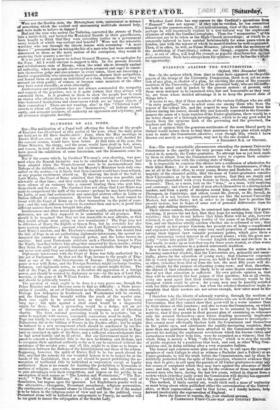SIR—The most remarkable phsenomenon attending the present University Commission is
the apathy of the very persons who are most directly inte- rested in it, namely, the Under-graduates. No attempt has as yet been made by them to obtain from the Commissioners leave to express their satisfac- tion or dissatisfaction with the existing state of things.
It is impossible to construe this silence into a confession of admiration for their Alma Mater ; for it must be notorious to the Commissioners, if they are at all fit for their office, to every young Master and Bachelor, and to the majority of the educated public, that the mass of Under-graduates consider their Universities as by no means alma mates; that they are deeply and thoroughly dissatisfied with every feature in them, scholastic, religious, and economic. They, as a mass, look on the "dons," as a mass, with suspicion and contempt ; and where a knot of men attach themselves to a distinguished teacher, and form a party of disciples round him,—as some do reand.Mr. Thompson in Cambridge, and others-round-Mr. Jewett, or Mr. Sewell, in Oxford —it is not because these gentlemen are like the normal University Masters, but unlike them ; not in order to be taught how to practise the present system, but in hopes of some sort of personal deliverance from its ghastly and chilling insincerity.
Their silence cannot, therefore' be construed into satisfaction. If it prove anything, it proves the sad fact, that they hope for nothing from their Uni- versities; that they do not believe that Alma Mater will be able, however reformed, to give them anything worthy of the name of an English educa- tion, and are therefore utterly careless whether she is reformed or not ; that they regard as her proper function, her present one of being-a complicated and expensive lottery, wherein some very small proportion of candidates on taking their degrees draw valuable pecuniary prises, which give them a yearly increasing vested interest in all present abuses ; while the.great ma- jority "retire into public life"—become English citizens and dwellers in a real world, to make up as best they can for three years wasted, or often worse than wasted, in obedience to a general aristocratic tradition. Now it does certainly still appear to ine, though I confess the notion is becoming somewhat obsolete, that the Universities are, primarily and essen- tially, places for the education of young men; that whatsoever corporate life or vested interests they may possess, are held in fief from some authority or other, (whether from God or from the law, the next fifty years will de- cide,) simply for the purpose of educating young men; and that, therefore, the objects of that education are likely to be in some degree conscious whe- ther or not that education is sufficient. My own private opinion is, that they will be absolutely the best judges of that question. but at all events, every one must agree that their testimony to the contrary would be the strongest which could be given : for young men may be possibly-satisfied with too little superintendence ; but when the scholars-themselves begin to complain that their masters are not-severe enough, how utter must belie neglect! I therefore take the liberty, of solemnly warning, through the medium of your columns, all Under-graduates or Bachelors who are well-disposed to the Universities, that they cannot show that good-will in a worse manner than by their silence at this juncture ; and also to warn the Commission, on-which I see the names of men whom I well know to be actuated by the highest motives, that if they persist in their present plan of examining as -witnesses only the accused themselves—men whose standing necessarily implicates them in the very charges which the Commission professes to investigate— they cannot more effectually blacken both the Commission and themselves in the public eyes, and corroborate the rapidly-increasing suspicion, that more than one gentleman has been attached to the Commissiou -simplyto prevent his making the unpleasant revelations which his known virtue and earnestness -would draw from him, were he examined as a witness; that the whole thing is merely a Whig " offa Cerbero," which is to stop the mouth of public suspicion by a ponderous blue book, and end, as other Whig Com- missions end, in doing nothing after a very expensive fashion.
The honest and common-sense plan seems to be, to call upon the younger members of each College to elect as witness a Bachelor (not a Fellow) or an IJuder.graduate, to tell the truth before the Commissioners, and by them be faithfully protected from the spite of their superiors, whatever evidence they may dare to give; to call upon the parents of all Under-graduates to state any fair causes of complaint which they may have against the educators of their sons; and last, but not least, to ask for the evidence of those talented and earnest men who have, during the last few years, retired in disgust from a system which (whether justly ornot the Commission will decide) hasappenred to them "hateful both to God and to the enemies of God." This method, if fairly carried out, would elicit such a mass of testimony as must bring-about when published either the extermination of the Univer- sities, or their regeneration,—and by that latter, as I fondly believe, help forward incalculably the regeneration of England. I have the honour to remain, Sir, your obedient servant, „
A PA./MUDGE FIRST-CI:MS-MAN AND COUNTRY liECTOR.


























 Previous page
Previous page